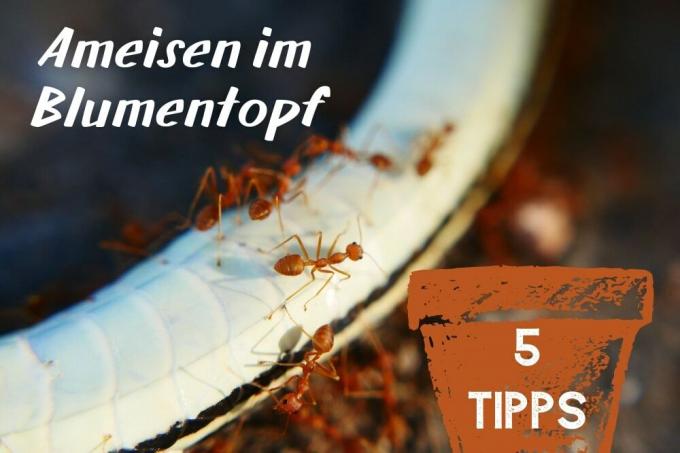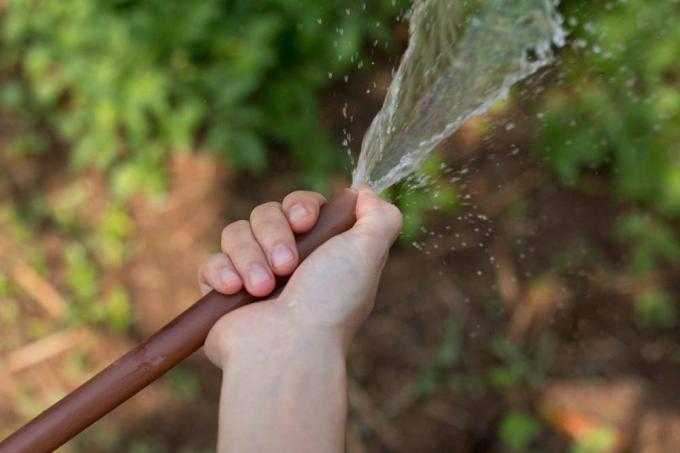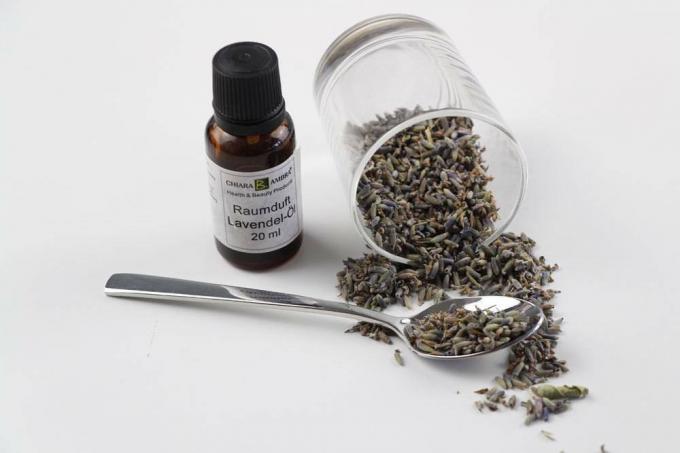
table of contents
- Flower pot ants: 5 measures
- Water
- Scent barriers
- citric acid
- Cucumber peels
- coffee
- frequently asked Questions
If you are struggling with ants in the flower pot, several methods are available to you. The use of insecticides is avoided in order not to impair the health of the potted plants.
In a nutshell
- Ant colonies should ideally be driven out of flower pots
- Plants can be damaged due to the underground nests
- Scent barriers and water are effective means of combating the insects
Flower pot ants: 5 measures
The causes for an ant settlement in the planter or pot can be numerous. In most cases, the insects have unhindered access to the pot, which is in a preferably sunny corner in the garden or on the terrace and thus offers ideal nesting conditions. Since they are a nuisance that can damage plants primarily by building their nests, ants are uninvited guests. In the garden, on the other hand, they are beneficial insects that keep the pest population under control. For this reason, ants should be driven out of the flower pot using one of the following measures.

Tip: If the insects have settled near their flower pots but have not yet found their way into the vessels, you should draw a barrier around them. Chalk or garden lime are well suited for this purpose, as Formicidae avoid the alkaline substances.
Water
One of the fastest and most effective measures against ants in the flower pot is to water the plant extensively. If it is a crop that can tolerate a lot of water or has not been watered intensively for a long time, you can use this method without problems. It is important that you water the plant in the pot for several days until the saucer is full. Since the corridors of the ant burrow are flushed, the insects have no rest and will leave it if the water does not stop. If the insects have been driven away, you should definitely make your pots ant-proof.

Scent barriers
Ants have a well-developed sense of smell, which they use to communicate with one another, track down food or become aware of dangers. It is precisely this strength that you should take advantage of, as you can use a variety of plants and spices to create an effective barrier against the insects. You rely on different forms of application that serve for direct control and further expulsion. If you have already noticed a settlement in your flower pot, the use of spices is recommended. This includes:
- laurel
- cinammon
- Cloves
It is the essential oils that ensure a pleasant smell for humans, which the insects do not get in any form. You literally run away from the spices when they are sprinkled as a fine mixture on the substrate in the bucket. The insects can no longer move freely in this way and will look for a new location for their nest. Alternatively, you can spread the spices around the pot as oils. To do this, simply drip a little of the oils onto a cloth and position it. Depending on the weather, this process has to be repeated several times a day until the animals have moved out. You can also set up herbs that have a protective effect on the insects:

- lavender
- marjoram
- thyme
- Mints
- chervil
If you don't want to set up herbal pots, the essential oil of these is also suitable.
Note: Camphor, which you can use in the same way, has also proven to be an effective protection against ants. The resin is not so cheap compared to the mentioned spices and has to be crushed beforehand, which does not make the application interesting for everyone.
citric acid
Has a similar effect as the scent barriers citric acid. Citric acid not only smells unpleasant to the animals, they sometimes ingest it and are driven away due to the taste. Ants are not exactly keen on sour flavors, which makes it possible to use them as a means of combating them. But since you shouldn't spread pure citric acid on the substrate, put on a lemon instead. The lemon juice is completely sufficient, because it contains five to seven percent of the acid. It doesn't matter whether you use an organic lemon, as it's all about the juice and not the peel. The method is applied in the following way:

- Cut the lemon open
- squeeze into bowl
- Dip the cloth in the juice
- place on substrate in flower pot
Repeat this procedure periodically until the insects have sworn off your flower pot. Depending on the size of the settlement, this may take a while, but over time you will get rid of the animals completely.
Cucumber peels
Instead of smells and tastes, cucumber peels are used as a deterrent, as they contain a large amount of bitter substances. Bitter substances are not only unpleasant in taste, they are even poisonous for arthropods. For this reason, the insects do not go near the shells once they have noticed them and inform the colony of this immediately. They are used in the following ways:

- Peel the cucumber
- Place the slices inside out on the substrate
- wait
A big advantage of this method is the low cost, as you can even use cucumbers from your own farm. After a while, remove the cucumber skins and replace them with new ones so that they do not rot on the substrate. Do not worry. The bitter substances pose no danger to your plants.
coffee
Not to be forgotten when fighting ants is coffee. Coffee is part of the long list of measures that work against the insects in the flower pot and that you can use with little effort. Again, the intense smell is the cause of the effective action against the ants. The arthropods can not stand this and leave the flower pot after a short time when the coffee powder has been distributed. Coffee powder in the following variants is suitable for this measure:
- fresh
- Pomace from a fully automatic coffee machine
- Pomace from filters

As you can see, you can actually use any ground coffee as long as it has been ground finely enough. Let it dry a little before use so that it is not applied too wet. Spread the powder on the substrate or fill it directly into the ant passages that you can reach from the outside. With a spoon or chopstick you can push the powder deeper into the substrate, which increases its effectiveness.
frequently asked Questions
Baking soda has been touted as an effective home remedy against Formicidae for decades. Behind this is the caustic effect, which causes the insects to die miserably on contact with the powder. The problem: the insects avoid the powder as much as possible. You shouldn't sprinkle too much of this, especially in the flower pot, otherwise your plants could also suffer from it. Baking soda is just too unreliable and therefore not recommended.
In addition to the use of scent and limescale barriers, you should make sure that the animals do not find any food near the flower boxes. Ants are often guided by the availability of food sources and for this reason the location of the flower pots should be kept clean. You should also make sure that no aphids settle, as these are practically pursued by the capable insects and will happily occupy your flower pots.
Formicidae are not only found in flower pots or planters. Raised beds are also often chosen by insects for building nests and tend to undermine a large number of plants in them. Since the methods mentioned do not always work so easily in raised beds, you should rely on water. Flood the raised bed several times in a row to flush out the nest and the insects. In most cases this measure is sufficient.
